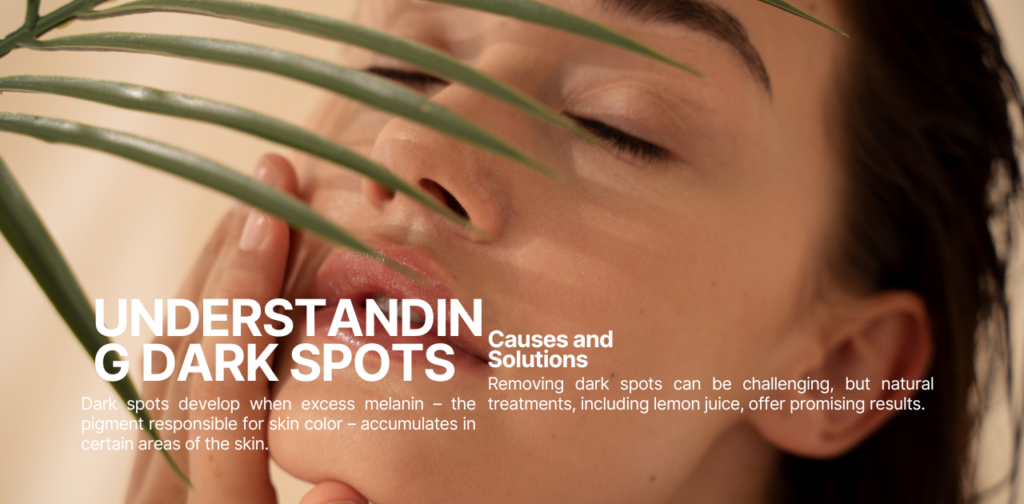Dark spots, also known as hyperpigmentation, can be a frustrating skin concern for many people. Various factors, such as sun exposure, aging, acne scars, and hormonal imbalances, contribute to the appearance of these spots. Fortunately, natural remedies like lemon juice have been found to be effective in reducing dark spots and promoting a more even skin tone. This article will discuss how lemon juice can help lighten dark spots on the face, the science behind its effectiveness, and safe methods for application.
Understanding Dark Spots: Causes and Solutions

Dark spots develop when excess melanin – the pigment responsible for skin color – accumulates in certain areas of the skin. Common causes include:
- Sun Exposure: UV rays stimulate melanin production, leading to sunspots and uneven skin tone.
- Aging: As we age, melanin-producing cells can become overactive, resulting in age spots.
- Acne Scars: Inflammatory responses to acne often leave behind dark marks as the skin heals.
- Hormonal Changes: Conditions like melasma, common during pregnancy, can trigger dark spots due to hormonal shifts.
Removing dark spots can be challenging, but natural treatments, including lemon juice, offer promising results.
Why Lemon Juice? The Power of Citric Acid

Lemon juice is rich in citric acid, a natural alpha hydroxy acid (AHA) that is commonly used in skin-brightening and exfoliating products. Here’s how citric acid works on the skin:
- Exfoliation: Citric acid helps exfoliate dead skin cells, which can lighten dark spots and improve skin texture.
- Antioxidant Properties: Lemons contain vitamin C, an antioxidant that helps combat free radicals and supports collagen production for healthier, rejuvenated skin.
- Melanin Inhibition: Vitamin C also has a melanin-inhibiting effect, which can prevent dark spots from becoming more pronounced.
With these benefits, lemon juice is often considered a powerful, natural solution for tackling hyperpigmentation.
How to Use Lemon Juice to Remove Dark Spots on the Face

While lemon juice can be effective for lightening dark spots, it’s essential to use it safely. Below are several methods to harness its benefits without risking skin irritation.
1. Lemon Juice and Water Solution
For a gentle approach, dilute lemon juice with water to minimize the acidic concentration.
How to Apply:
- Mix equal parts lemon juice and water.
- Soak a cotton ball in the mixture and apply it to the affected areas.
- Leave it on for 10-15 minutes, then rinse with lukewarm water.
- Apply moisturizer to prevent dryness.
2. Lemon and Honey Face Mask
Honey is a natural humectant, meaning it retains moisture in the skin. Combining lemon juice and honey creates a mask that lightens spots while keeping the skin hydrated.
How to Apply:
- Mix one teaspoon of lemon juice with one teaspoon of honey.
- Apply the mixture to dark spots and leave it on for 20 minutes.
- Rinse thoroughly with warm water.
- Pat dry and moisturize to seal in hydration.
3. Lemon Juice and Aloe Vera Gel
Aloe vera has soothing and healing properties that can counteract the potential irritation from lemon juice, making it ideal for sensitive skin.
How to Apply:
- Combine one teaspoon of lemon juice with two teaspoons of aloe vera gel.
- Massage gently onto the dark spots.
- Leave it on for 15-20 minutes before rinsing off.
- Use daily for best results.
4. Lemon Juice and Turmeric Paste
Turmeric is known for its anti-inflammatory and brightening effects, making it a great complement to lemon juice.
How to Apply:
- Mix one teaspoon of lemon juice with a pinch of turmeric powder to form a paste.
- Apply the paste to dark spots and let it sit for 10-15 minutes.
- Rinse with lukewarm water.
- Be cautious as turmeric may stain; rinse thoroughly.
Safety Tips for Using Lemon Juice on the Skin

1. Conduct a Patch Test
Before applying lemon juice to the face, do a patch test on a small area of skin to check for any adverse reaction.
2. Use Sunscreen
Lemon juice can make the skin more sensitive to sunlight. Always apply a broad-spectrum sunscreen before going outside to protect against sun damage.
3. Avoid Overuse
Limit the use of lemon juice treatments to 2-3 times a week. Overuse can lead to skin irritation, redness, and increased dryness.
4. Moisturize Regularly
Lemon juice can be drying to the skin, so follow up with a moisturizer to keep the skin hydrated and healthy.
Benefits of Using Natural Remedies Like Lemon Juice for Dark Spots
Cost-Effective Solution
Natural ingredients like lemon juice are affordable and accessible, making them an economical choice compared to expensive skincare products.
Reduced Chemical Exposure
Using natural remedies minimizes exposure to harsh chemicals often found in commercial skincare products, promoting healthier skin.
Environmentally Friendly
Natural remedies generate less waste and pollution, aligning with eco-conscious and sustainable beauty practices.
Alternatives to Lemon Juice for Treating Dark Spots
While lemon juice is effective, some individuals may have sensitive skin or allergies. Here are a few other natural alternatives:
1. Apple Cider Vinegar
The acetic acid in apple cider vinegar can help lighten pigmentation when used sparingly.
2. Green Tea Extract
Green tea has antioxidants that help reduce inflammation and may improve skin discoloration over time.
3. Papaya
Papaya contains natural enzymes that help exfoliate dead skin cells, leading to a brighter complexion.
4. Almond Oil
Rich in vitamin E, almond oil can nourish the skin and may help reduce the appearance of dark spots.
Conclusion
Removing dark spots naturally with ingredients like lemon juice offers a gentle yet effective way to improve skin tone and texture. By using well-researched methods and taking the necessary precautions, lemon juice can become a valuable part of your skincare routine. Remember to stay consistent with applications and protect your skin with sunscreen, as sun exposure can hinder progress. With time, patience, and dedication, a clearer, more radiant complexion is achievable.
Read More: Wellhealthorganic.com: Exploring Organic Wellness for a Healthier Life | 10 Essential Well Health Tips in Hindi Wellhealthorganic : Tips for a Balanced Life


